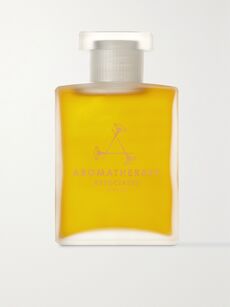Should You Adapt Your Self-Care To Your Cycle?
Aligning your self-care to your monthly cycle is said to ease symptoms, boost benefits and improve your overall wellbeing. Here, DANIELLE FOX discovers more about this new health and beauty movement
‘Cycle synching’ is the term used to align your lifestyle, diet and even your workout to your monthly hormonal cycle, and now self-care is getting involved, too – and it makes sense. Tune into your cycle and you might start to notice your energy fluctuating, focus changing and, at certain points, you and your skin becoming just that little bit more sensitive.
“We’re waking up to the fact that, as women, we have specific biochemistry that is very distinctive from the male physiology and there is a thirst to know more,” says Rhian Stephenson, naturopath, nutritional therapist and founder of health brand Artah. This, coupled with the fact that it’s only relatively recently that the FDA allowed women in the US to participate in clinical research and be included in trials (1993), has made the movement even more important. “The health of our menstrual cycle is not just about having a child, but it contributes to every aspect of our health,” explains Stephenson. “It’s also been recently affirmed by the American College of Obstetricians and Gynecologists, whose directives serve as a guidance to doctors (including those who are not obstetricians and gynecologists), that our periods are a ‘fifth vital sign’ – meaning that the menstruation cycle is as important a health indicator as changes in body temperature, pulse, breathing rate and blood pressure.”
So what happens when you tune into your cycle and align your self-care routine? “As a woman, it’s normal to notice a shift in energy levels, food cravings and your general mood throughout the month, as these all fluctuate depending on where you’re at in your menstrual cycle. Cycle synching is honoring what is naturally going on inside your body and modifying your nutrition, exercise, how you interact with your environment, and even what products you’re using, to get the most out of your biology at specific times; you’re working with your body instead of against it,” explains Stephenson.
So, by choosing the right products, ingredients and rituals each week, you will get the most out of them – not only in terms of benefits for the skin and body, but also for your emotional and mental health. It’s time to tune in…
Week 1: the follicular phase
The start of your bleed and when your hormones go back to their baseline is known as your ‘follicular phase’. “In these first few days you naturally feel tired, have cramping, low energy and your skin can look and feel dehydrated, but by day three these symptoms tend to lift and, emotionally, women often feel like this is a fresh start,” says Stephenson. Hydrating aromatherapy body oils, muscle-easing bath salts, and body exfoliants are great to add on to your regime during this week.
 AROMATHERAPY ASSOCIATESInner Strength Bath & Shower Oil, 55ml
AROMATHERAPY ASSOCIATESInner Strength Bath & Shower Oil, 55ml REN CLEAN SKINCARE+ NET SUSTAIN Moroccan Rose Otto Sugar Body Polish, 330ml
REN CLEAN SKINCARE+ NET SUSTAIN Moroccan Rose Otto Sugar Body Polish, 330ml
Week 2: nearing peak ovulation
“Feeling confident, more vibrant and outgoing are just some of the emotions my patients tell me they feel during this week of their cycle,” says Stephenson. At this stage, your oestrogen and testosterone levels increase and you’re working towards your peak of ovulation (most women ovulate at day 15 or 16), which has a huge – often positive – effect on your libido. This is your best week: you have high energy, skin is plumped naturally from the rising oestrogen, and we tend to look and feel our best. Glow enhancers to boost this natural radiance are ideal, but it’s also important to recognize that our energy can be a little erratic around this time, so anything that helps improve focus is a must.
 SUNDAY RILEYC.E.O. Glow Vitamin C + Turmeric Face Oil, 15ml
SUNDAY RILEYC.E.O. Glow Vitamin C + Turmeric Face Oil, 15ml
Week 3: the luteal shift
This marks the shift into the luteal phase, where we become a little more introverted, anxious, shy and self-conscious. This is when we respond well to nourishment and reflection, advises Stephenson. Nutritionally, we’re burning up to 270 more calories a day, so instead of giving in to your sweet tooth, opt for sweet root vegetables and carbs. This is also a great time to have a plant-rich diet full of nourishing oils, as this point in our cycle often sees our skin start to suffer from acne or breakouts. But it’s not all negative: the surge in progesterone can help boost our memory, and our bodies are more protected against injury.
Week 4: the serotonin dip
When we hit our lowest point of serotonin, we naturally become more sad than anxious; sleep is disrupted; and while our appetite increases, our gastric motility slows down, which means bloating and water retention. Try to avoid alcohol this week – B vitamins and magnesium are super-low, so we’re prone to more inflammation and puffiness. However, gua sha is a brilliant tool for kickstarting the lymphatic system and draining away any water we’re holding onto.
RELATED READING
The model featured in this story is not associated with NET-A-PORTER and does not endorse it or the products shown


